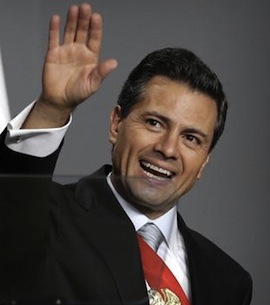
After several months in office, Mexican President Enrique Peña Nieto has finally revealed some of his administration’s initial plans to address the nation’s ongoing drug war. Speaking to an audience in Aguascalientes, Mexico, he said the government will spend $9.2 billion on social programs in the 251 most violent towns and neighbourhoods across the country, ranging from road building to increasing school hours. The plans adhere to his earlier promise to move away from the aggressive tactics of his predecessor Felipe Calderon; escalating violence resulted in 60,000 drug war deaths in Mexico during Calderon’s leadership. Instead, Peña Nieto says he will focus on crime prevention, particularly deterring young people from joining criminal organizations. “It’s clear that we must put special emphasis on prevention, because we can’t only keep employing more sophisticated weapons, better equipment, more police, a higher presence of the armed forces in the country as the only form of combating organised crime,” he said. Echoing these sentiments, interior secretary Miguel Ángel Osorio Chong said anti-violence efforts will include improving health and social services, job assistance for single mothers, and increasing the number of schools that have a full, eight-hour academic day—from 6,000 to 40,000 . “This is the first state policy that puts the citizen, and our youth, at the center of security,” said Osorio Chong. “We’re convinced that fighting and punishment don’t solve the problem.”
Analysts say the new strategy signifies an important shift in tone from Calderon’s presidency, but the plan still lacks details. And many remain doubtful that anything will actually change in the beleaguered country’s battle against drug cartels. “They’re going to throw a lot of money at a lot of programmes. That is ground for scepticism,” says Alejandro Hope, a security analyst and former high-ranking official in Mexico’s national intelligence agency. “The level of specificity is not there yet. I find this disconcerting.”
